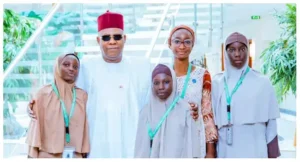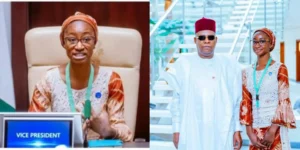17-Year-Old Joy Ogah Makes History as Nigeria’s Vice President for a Day — Advocates for Girl-Child Education
In a powerful symbol of youth leadership and gender equality, 17-year-old Joy Ogah made history by stepping into the role of Nigeria’s Vice President, Kashim Shettima, for a day.
The remarkable event, which took place on Monday in Abuja, was part of an initiative by PLAN International, designed to promote the voices of young girls and highlight their potential as future leaders. Ogah’s short but impactful time in office placed national attention on the urgent need for inclusive education and equal opportunities for girls across the country. Eyes Of Lagos reports,
A Voice for the 10.5 Million Out-of-School Children
In her address during the symbolic takeover, Ogah passionately drew attention to the alarming statistics surrounding Nigeria’s education system. She revealed that more than 10.5 million children remain out of school nationwide — and over 60 percent of them are girls.
According to Ogah, this crisis is not just a statistic but a call to action for leaders, educators, and communities to rethink their priorities.
“Every girl deserves access to classrooms, dignity, and opportunity,” she said. “When girls are protected and empowered, peace becomes possible.”
Her words resonated deeply across the nation, sparking conversations about how cultural norms, poverty, and insecurity continue to hinder millions of young girls from completing their education.
Shettima Commends the Initiative
Nigeria’s Vice President, Kashim Shettima, warmly welcomed Joy Ogah’s advocacy and commended her courage and vision. He reaffirmed the federal government’s commitment to improving education through gender-inclusive programs and promised continued collaboration with NGOs like PLAN International.
“Your voice represents hope for millions of girls,” Shettima noted. “We are dedicated to ensuring that every Nigerian child, especially girls, can learn in a safe and supportive environment.”
He added that the administration’s ongoing Renewed Hope Agenda includes targeted policies aimed at expanding access to education, empowering women, and supporting youth-led projects.
Health, Hygiene, and Nutrition in Schools
Beyond the classroom, Joy Ogah also highlighted critical issues often overlooked in education policy — health, hygiene, and nutrition.
She called for free sanitary products, clean water, proper sanitation, and balanced nutrition in schools, explaining that these essentials are key to keeping girls in class and promoting gender equality.
“A girl should not have to miss school because of her period or because there’s no clean water,” Ogah emphasized. “Basic amenities should be a right, not a privilege.”
The Office of the Vice President acknowledged her recommendations and promised to work closely with relevant ministries to implement practical, sustainable solutions that ensure better school environments for children, especially girls in rural communities.
Youth Leadership and Ongoing National Programs
Ogah’s symbolic role aligns with ongoing federal and NGO-driven initiatives aimed at uplifting women and young people.
Programs under the Renewed Hope Social Impact Interventions are currently reaching more than 10 million women across Nigeria, providing access to livelihood grants, digital skills training, clean energy, and entrepreneurial empowerment.
In addition, the Federal Ministry of Education and National Assembly Committees on Education continue to push gender-inclusive reforms, mentorship opportunities, and awareness campaigns to eliminate discrimination in learning spaces.
A Generation Ready to Lead
Joy Ogah’s brief time as Vice President serves as a reminder that Nigeria’s youth are not just the leaders of tomorrow — they are already influencing policies and conversations today.
Her leadership moment reflects a growing movement across Africa where young people, particularly girls, are demanding seats at the table and challenging the systems that limit their progress.
As Nigeria continues to confront the challenges of inequality, poverty, and education gaps, voices like Joy Ogah’s illuminate a hopeful path forward — one where every child, regardless of gender, can learn, lead, and thrive.










